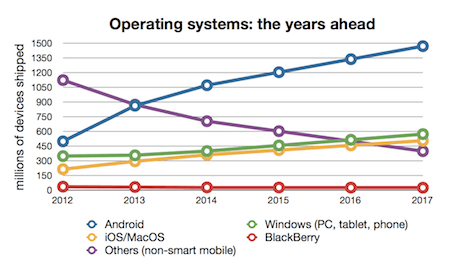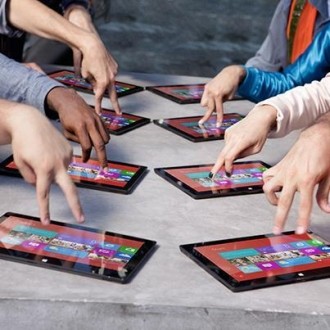It's no secret that tablets and smartphones are gradually occupying more computing time among folks who don't need the horsepower of a full-fledged PC. Although this trend has prompted many to predict the death of PCs, it's fairer to say that high-end desktops aren't going anywhere, we're just witnessing a change of preferred platforms among standard users – a shift that could leave Microsoft irrelevant in as little as four years, Gartner warns.
"While there will be some individuals who retain both a personal PC and a tablet, especially those who use either or both for work and play, most will be satisfied with the experience they get from a tablet as their main computing device," Gartner research VP Carolina Milanesi said. "As consumers shift their time away from their PC to tablets and smartphones, they will no longer see their PC as a device that they need to replace on a regular basis."
Considering Microsoft's dominance is primarily in PCs, declining desktop and laptop sales isn't good news for the software giant. However, the company's weak presence in the booming mobile segments presents a bigger concern. Microsoft has largely been one step behind its rivals when it comes to smartphones and tablets, and shipments of Windows-branded devices including PCs and mobile hardware will soon be dwarfed by others.
Unless something changes, Gartner predicts that shipments of Apple's devices (including iOS and Mac OS) will reach parity with Windows PC and mobile hardware – something that reportedly hasn't happened since the 1980s. During the same period, shipments of Android devices will total about twice that of either Microsoft or Apple – a gap that will continue to grow through 2017 when Google's OS is expected to ship on 1.5 billion devices.

"Winning in the tablet and phone space is critical for them to remain relevant in this shift," Milanesi told the Guardian. "We're talking about hardware displacement here – but this shift also has wider implications for operating systems and apps... Android is going to get to volumes that are three times those of Windows. From a consumer perspective, the question becomes: what software do you want to have to get the widest reach on your devices?"
She also noted that many people in developing markets are more likely to have a smartphone or tablet as their first "computer," and they'll likely stick with devices that provide a smartphone-like experience. Microsoft could also face increasing trouble attracting application developers as Apple and Android greatly outpace the company's smartphone and tablet shipments, and few things will kill an outfit's mobile efforts faster than having a weak ecosystem.
